Investigating Environmental Risks in Maritime Logistics: Australian Cases
Added on 2023-05-30
28 Pages5464 Words355 Views
Chapter 2: Research Methodology
Investigate environmental risks in maritime logistics with a focus on
Australian cases
1
Investigate environmental risks in maritime logistics with a focus on
Australian cases
1
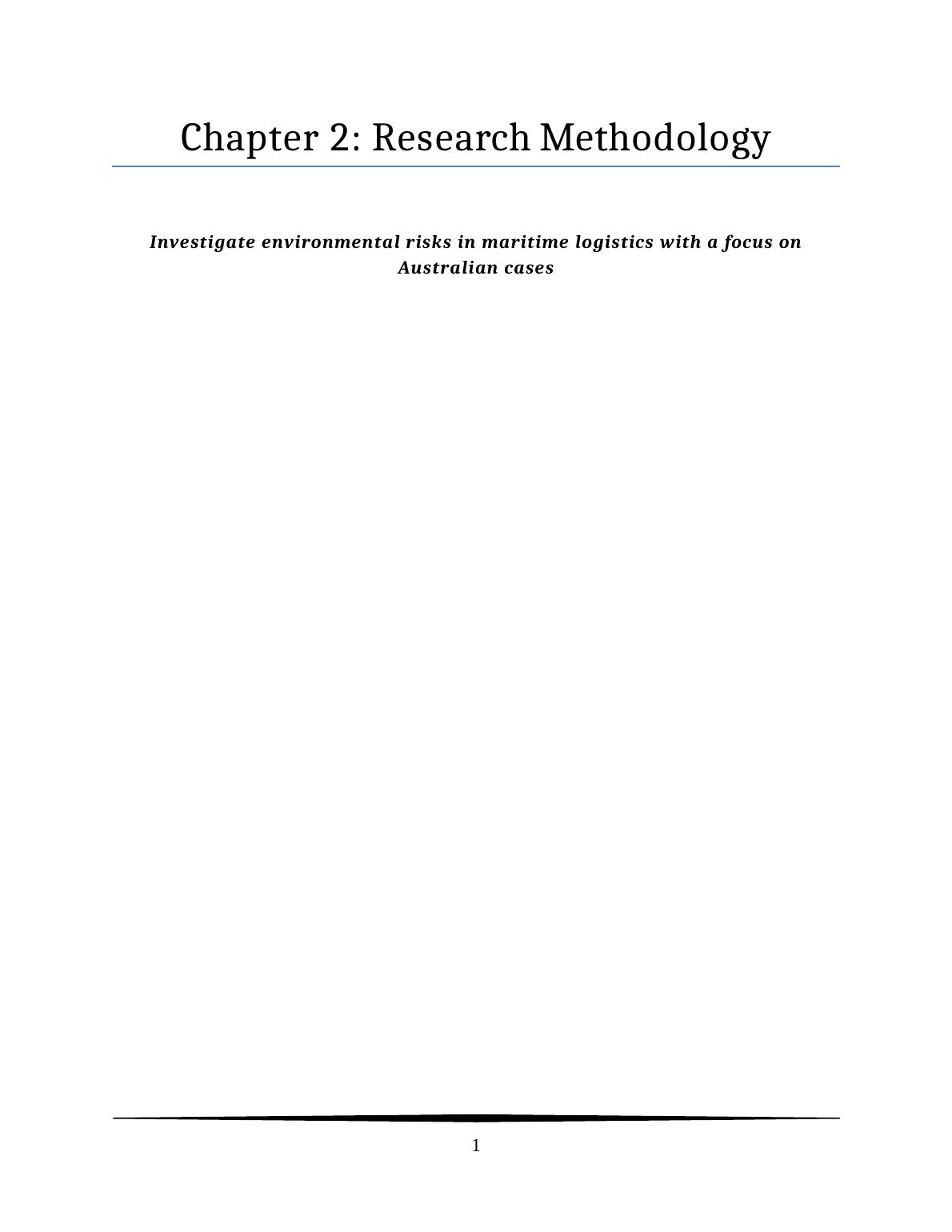
Abstract
A research methodology comprises one of the most important aspects for conducting research of
any type. In order to research or study the broad topic of environmental risks in maritime
logistics, an appropriate research method has to be ascertained. In the current scope of
methodology, a positivism philosophy with deductive technique has been adopted. A descriptive
design for the study allows evaluating various concepts for the study. This study has adopted
primary along with secondary data collection of qualitative along with quantitative data. The
primary data has been collected by means of survey technique by developing a questionnaire,
whereas secondary data has been collected by means of internet sources. A specific budget has
been devised for completing this study. Though the study was aimed at encompassing varied
different data and concepts, there are some limitations that have been faced in the study.
2
A research methodology comprises one of the most important aspects for conducting research of
any type. In order to research or study the broad topic of environmental risks in maritime
logistics, an appropriate research method has to be ascertained. In the current scope of
methodology, a positivism philosophy with deductive technique has been adopted. A descriptive
design for the study allows evaluating various concepts for the study. This study has adopted
primary along with secondary data collection of qualitative along with quantitative data. The
primary data has been collected by means of survey technique by developing a questionnaire,
whereas secondary data has been collected by means of internet sources. A specific budget has
been devised for completing this study. Though the study was aimed at encompassing varied
different data and concepts, there are some limitations that have been faced in the study.
2
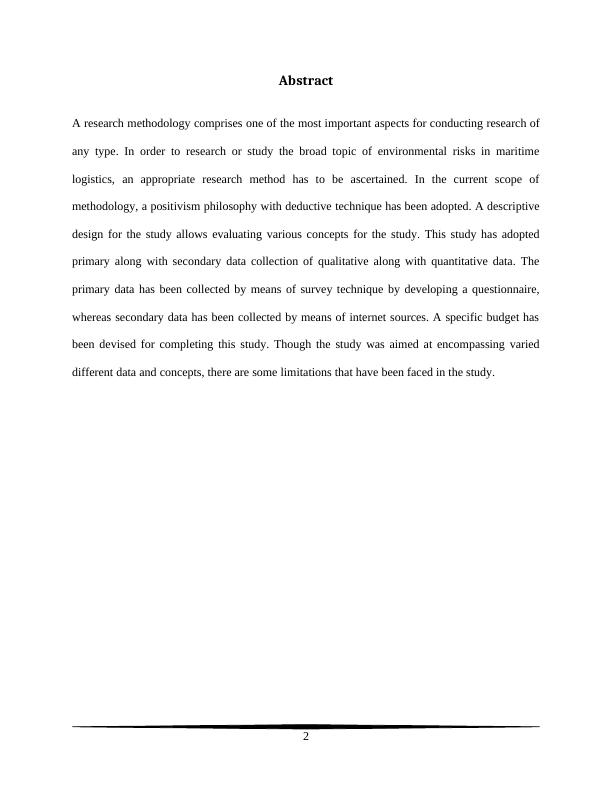
Table of Contents
Abstract............................................................................................................................................2
Introduction......................................................................................................................................4
Research design...............................................................................................................................5
Target population.............................................................................................................................7
Sampling size...................................................................................................................................8
Sampling technique.........................................................................................................................9
Data collection...............................................................................................................................10
Data collection instrument.............................................................................................................11
Data collection procedure..............................................................................................................12
Questionnaire development...........................................................................................................13
Questionnaire Content and Design................................................................................................13
Reliability and Pilot Study.............................................................................................................14
Validity..........................................................................................................................................15
Ethical consideration.....................................................................................................................16
Research general guideline............................................................................................................16
Data analysis..................................................................................................................................17
Conclusion.....................................................................................................................................18
References......................................................................................................................................20
Appendix........................................................................................................................................24
3
Abstract............................................................................................................................................2
Introduction......................................................................................................................................4
Research design...............................................................................................................................5
Target population.............................................................................................................................7
Sampling size...................................................................................................................................8
Sampling technique.........................................................................................................................9
Data collection...............................................................................................................................10
Data collection instrument.............................................................................................................11
Data collection procedure..............................................................................................................12
Questionnaire development...........................................................................................................13
Questionnaire Content and Design................................................................................................13
Reliability and Pilot Study.............................................................................................................14
Validity..........................................................................................................................................15
Ethical consideration.....................................................................................................................16
Research general guideline............................................................................................................16
Data analysis..................................................................................................................................17
Conclusion.....................................................................................................................................18
References......................................................................................................................................20
Appendix........................................................................................................................................24
3
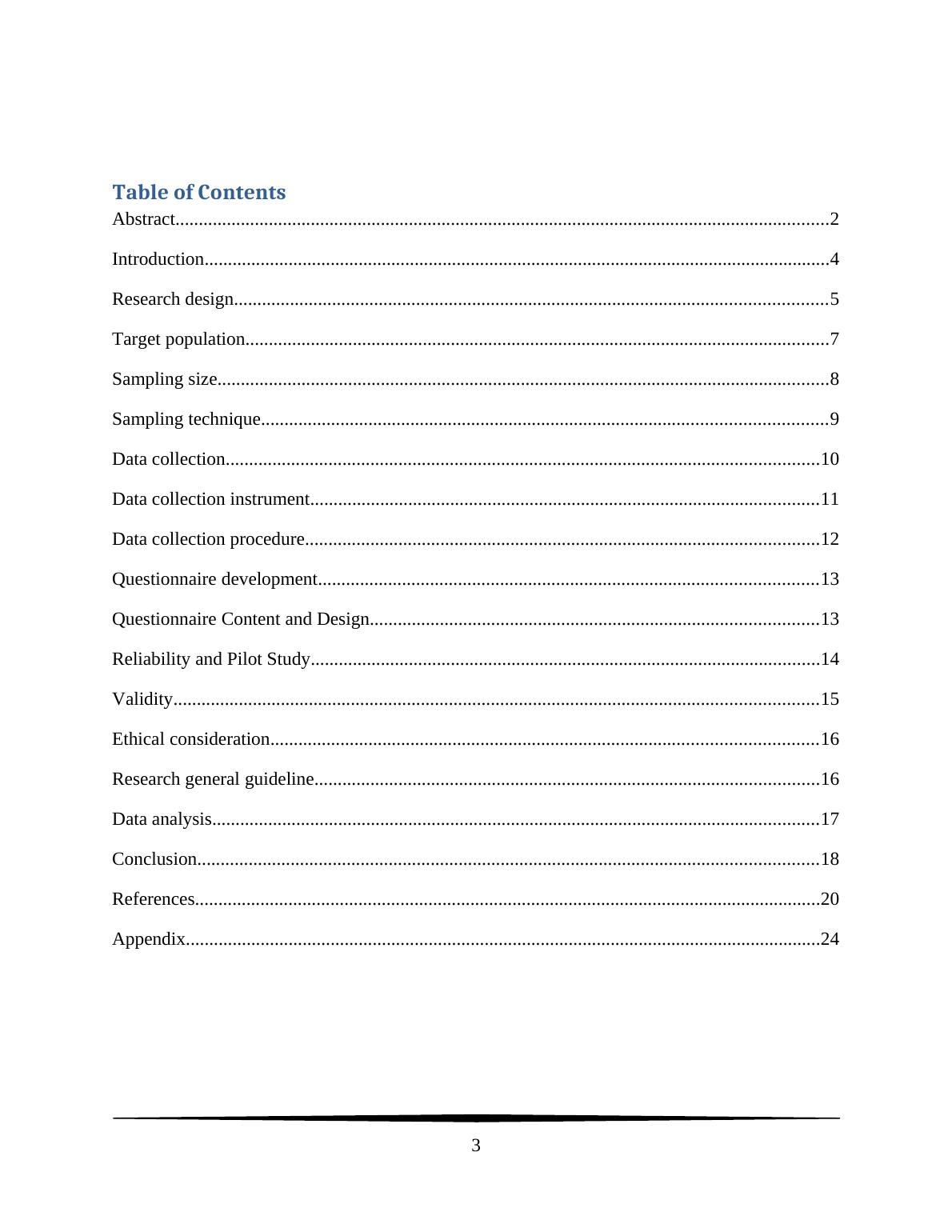
Introduction
The sea transport industry in Australia is growing dynamically given the current surge in global
trade and commerce. It becomes imperative to determine the various risks facing the growing
industry. The current research methodology focuses on analyzing the various environmental risks
associated with maritime logistics along with the analysis of the vulnerability of such risks with
the challenges in implementing policies and practices for decision support and recommending
strategies for mitigation environmental risks associated in maritime logistics. Research
methodology is the most integral part of any study (Lewis, 2015, pp.473-475; Forsyth, 2016,
pp.372-387). The process of research includes scientific processes of quasi-experimental,
experimental and non-experimental methods relative for the study. In order to conduct a research
primary and secondary information as well as data is collected on the topic. Similar to other
studies, this research undertakes a systematic investigation for the exploration of knowledge
regarding environmental risks and their mitigation. As research undertakes a systematic
evaluation for exploring of existing knowledge, it provides a process which supports
confirmation of theories as well as validating earlier research in the domain (Creswell &
Creswell, 2017).
The current research procedure will take into account various investigating techniques to arrive
at various environmental risks which are facing the maritime transport industry along with an
evaluation of strategies to overcome such risks. The main objective of the research is to
analyse the factors that cause environmental hazards in marine logistics. The goal is to
identify the environmental risks of Marine Logistics and the vulnerability due to risks,
including workers and measures of adaptation of identity, through the policy of critical
4
The sea transport industry in Australia is growing dynamically given the current surge in global
trade and commerce. It becomes imperative to determine the various risks facing the growing
industry. The current research methodology focuses on analyzing the various environmental risks
associated with maritime logistics along with the analysis of the vulnerability of such risks with
the challenges in implementing policies and practices for decision support and recommending
strategies for mitigation environmental risks associated in maritime logistics. Research
methodology is the most integral part of any study (Lewis, 2015, pp.473-475; Forsyth, 2016,
pp.372-387). The process of research includes scientific processes of quasi-experimental,
experimental and non-experimental methods relative for the study. In order to conduct a research
primary and secondary information as well as data is collected on the topic. Similar to other
studies, this research undertakes a systematic investigation for the exploration of knowledge
regarding environmental risks and their mitigation. As research undertakes a systematic
evaluation for exploring of existing knowledge, it provides a process which supports
confirmation of theories as well as validating earlier research in the domain (Creswell &
Creswell, 2017).
The current research procedure will take into account various investigating techniques to arrive
at various environmental risks which are facing the maritime transport industry along with an
evaluation of strategies to overcome such risks. The main objective of the research is to
analyse the factors that cause environmental hazards in marine logistics. The goal is to
identify the environmental risks of Marine Logistics and the vulnerability due to risks,
including workers and measures of adaptation of identity, through the policy of critical
4
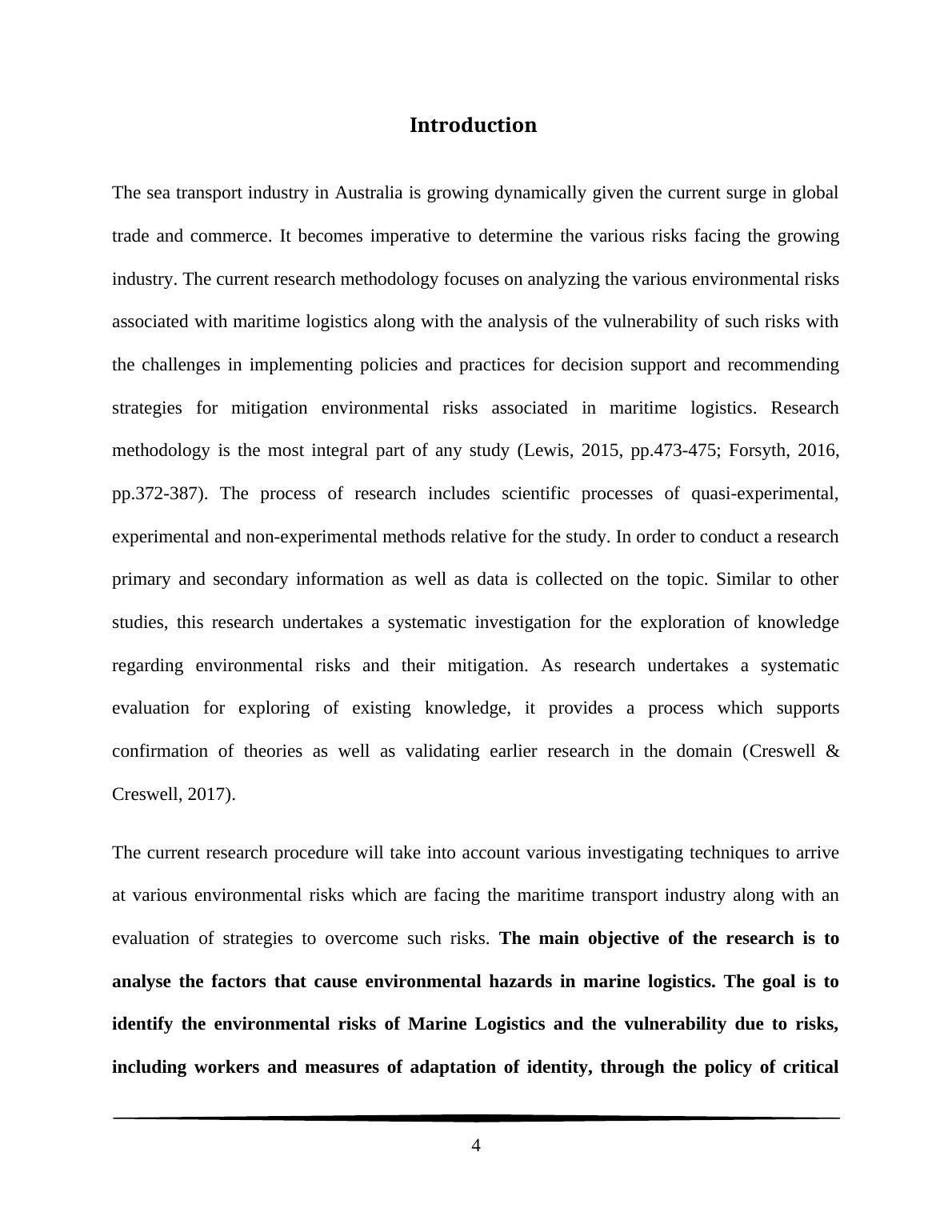
support and integrated decision analysis. The study also considered strategies aimed at
mitigating the environmental risks in maritime logistics.
Research design
Prior to arriving at a particular research design, ascertaining a research philosophy becomes
integral. Through research philosophy, belief related to observation has to be gathered and then
analyzed before their utilization. Epistemology is the evaluation of truth as against doxology,
which assumes the truth as being the philosophy of research (Meyers, Gamst & Guarino, 2016).
The major two research approaches are positivists and interpretive. A positivist’s philosophy
undertakes observation and then describes the phenomenon from an objective point of view,
before inferring the phenomenon. In interpretivism, a subjective intervention, in reality, is
assumed. For the purpose of this study, interpretive philosophy is considered (Parola et al., 2017,
pp.116-138).
A research approach can be in a qualitative or quantitative manner for a particular study. A
qualitative approach assumes subjective or descriptive determinants, whereas quantitative
approach specifies a mathematical or quantifiable determinant (Maxwell, 2012; Savin-Baden,
and Major, 2013; Heaver, 2015, pp.278-292). Studies, where scopes are similar in nature, are
referred to as naturalistic research or field research, specific researches are termed as
ethnographic and interpretive research. As this study has assumed an interpretive qualitative
research procedure, an in-depth and systematic evaluation of various happenings in natural
settings has been collected. This implies, the environmental risks that are faced normally have
been used in this study, while strategies or recommendations have arrived from similar outcomes
5
mitigating the environmental risks in maritime logistics.
Research design
Prior to arriving at a particular research design, ascertaining a research philosophy becomes
integral. Through research philosophy, belief related to observation has to be gathered and then
analyzed before their utilization. Epistemology is the evaluation of truth as against doxology,
which assumes the truth as being the philosophy of research (Meyers, Gamst & Guarino, 2016).
The major two research approaches are positivists and interpretive. A positivist’s philosophy
undertakes observation and then describes the phenomenon from an objective point of view,
before inferring the phenomenon. In interpretivism, a subjective intervention, in reality, is
assumed. For the purpose of this study, interpretive philosophy is considered (Parola et al., 2017,
pp.116-138).
A research approach can be in a qualitative or quantitative manner for a particular study. A
qualitative approach assumes subjective or descriptive determinants, whereas quantitative
approach specifies a mathematical or quantifiable determinant (Maxwell, 2012; Savin-Baden,
and Major, 2013; Heaver, 2015, pp.278-292). Studies, where scopes are similar in nature, are
referred to as naturalistic research or field research, specific researches are termed as
ethnographic and interpretive research. As this study has assumed an interpretive qualitative
research procedure, an in-depth and systematic evaluation of various happenings in natural
settings has been collected. This implies, the environmental risks that are faced normally have
been used in this study, while strategies or recommendations have arrived from similar outcomes
5
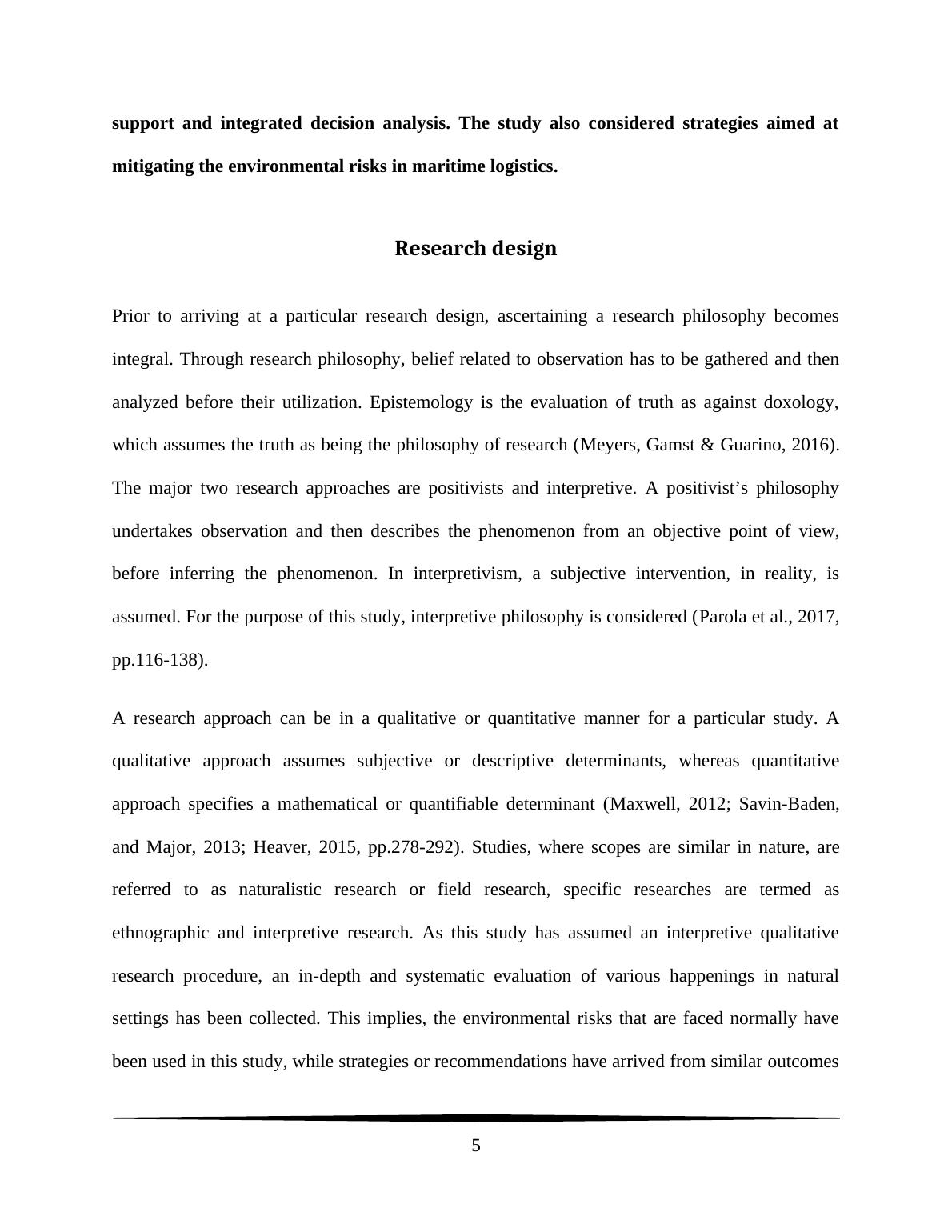
(Christensen, Johnson, Turner & Christensen, 2011; Morse, 2016). This study will collect and
make use of real-time data available in the maritime logistics industry and the varied
environmental risks facing them, with their analysis of suitable strategies that will allow
overcoming them. This study will deal with descriptive data from environmental risks that are
faced and have been experienced by employees across companies in Australia. This gap exists
when it comes to identifying environmental risks, analysing the problems of implementing
strategies and practices related to these risks and proposing appropriate mitigation strategies.
This study selects Australia because there is no information about the intimidation of
environmental risks in the logistics sector in a maritime context. In addition, the targeting of a
number of agents is involved in maritime logistics activities in Australia, and this study will be
the first known literature review in this context. These research results can be used as a
knowledge and reference data cadence for future research and industry experts. For conducting
this study primary, meaning first-hand sources, as well as second sources, had been employed.
Several newspapers, company magazines, books, articles, internet sources were referred for
developing the questionnaire for the study (Wahyuni, 2012; Lee, Chung, and Lam, 2016, pp.612-
631). This research will collect quantitative data as well as qualitative data and then apply
suitable analysis techniques for arriving at the results of the study.
The process of research design includes processes which are used for collecting data and then
analysis of the research problem, hypothesis, dependent and independent variable, design of the
experiment and data collection method with a statistical plan (Mitchell & Jolley, 2012). There
are many ways in which a research design might be specified and analyzing the scope of the
current study, the current research design can be specified to be descriptive in nature. In this
6
make use of real-time data available in the maritime logistics industry and the varied
environmental risks facing them, with their analysis of suitable strategies that will allow
overcoming them. This study will deal with descriptive data from environmental risks that are
faced and have been experienced by employees across companies in Australia. This gap exists
when it comes to identifying environmental risks, analysing the problems of implementing
strategies and practices related to these risks and proposing appropriate mitigation strategies.
This study selects Australia because there is no information about the intimidation of
environmental risks in the logistics sector in a maritime context. In addition, the targeting of a
number of agents is involved in maritime logistics activities in Australia, and this study will be
the first known literature review in this context. These research results can be used as a
knowledge and reference data cadence for future research and industry experts. For conducting
this study primary, meaning first-hand sources, as well as second sources, had been employed.
Several newspapers, company magazines, books, articles, internet sources were referred for
developing the questionnaire for the study (Wahyuni, 2012; Lee, Chung, and Lam, 2016, pp.612-
631). This research will collect quantitative data as well as qualitative data and then apply
suitable analysis techniques for arriving at the results of the study.
The process of research design includes processes which are used for collecting data and then
analysis of the research problem, hypothesis, dependent and independent variable, design of the
experiment and data collection method with a statistical plan (Mitchell & Jolley, 2012). There
are many ways in which a research design might be specified and analyzing the scope of the
current study, the current research design can be specified to be descriptive in nature. In this
6
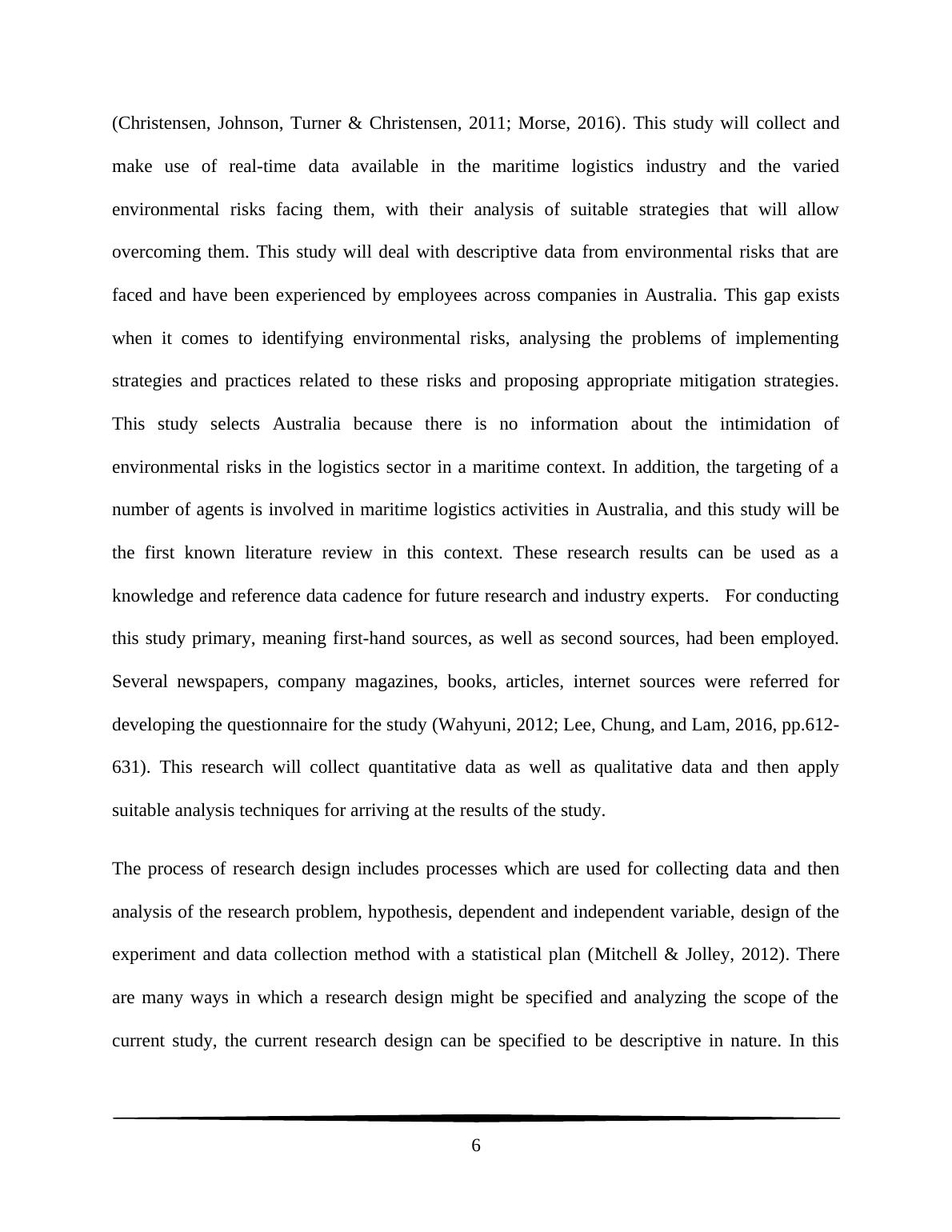
End of preview
Want to access all the pages? Upload your documents or become a member.
Related Documents
(PDF) Sustainability Challenges in Maritime Transportlg...
|15
|824
|131
Investigate Environmental Risk in Maritime Logistics and Hinterland Transportlg...
|25
|5232
|94
Investigate environmental risks in maritime logistics with focus on Australian caseslg...
|25
|4942
|464
Effect of Equal Employment Opportunity at the Workplacelg...
|27
|5049
|58
Accessing the Impact of Workplace Discrimination on Organisational Performancelg...
|13
|2951
|259
Primary and Secondary Research Methods for a Business Research Projectlg...
|28
|5713
|445
